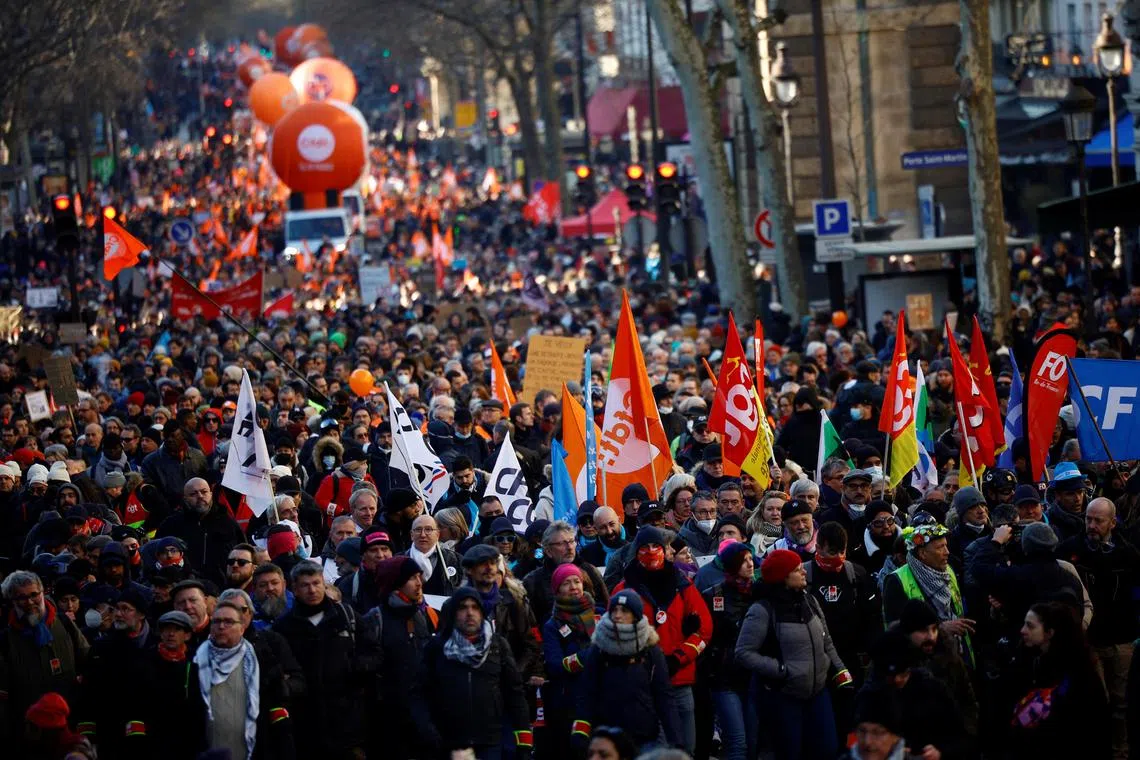French unions vow to fight on after fewer join pension protest
Sign up now: Get ST's newsletters delivered to your inbox

A "torchlight retreat" during a demonstration against a pensions reform plan in Le Havre, north-western France, on Feb 7, 2023.
PHOTO: AFP
PARIS – French labour unions pledged to keep up the pressure on President Emmanuel Macron to drop an unpopular plan to raise the retirement age
Around 757,000 took part in a third day of marches across the country.
That figure is down from at least 1.27 million on Jan 31, according to numbers from the Interior Ministry.
Participation in a general strike was also lower.
A fourth wave of protests is planned on Saturday, when unions will be keen to build on the momentum seen during the first two calls for action in January.
They are trying to make Mr Macron back down on his proposal to lift the minimum retirement age from 62 to 64.
The French leader insists he will see his programme through.
“The message this evening will be a call for massive demonstrations on Saturday,” CFDT union leader Laurent Berger said, according to Agence France-Presse.
The extent of public discontent will be closely watched by lawmakers.
They have started to review the draft pension reform Bill in the National Assembly ahead of a Feb 17 deadline for this round of debate to conclude.
‘Better pensions’
“We’re about full employment and better pensions,” Prime Minister Elisabeth Borne said in Parliament on Tuesday. If the government does nothing, this will lead to higher taxes, rising unemployment and a drop in purchasing power, or alternatively a drastic fall in pensions, she said.
Ms Borne said in an interview with Le Journal du Dimanche newspaper at the weekend that the government was considering another carve-out so more workers can retire before they turn 64.
The concession would add to other provisions designed to allow those who began working at a young age to retire earlier.
Opinion polls suggest these arguments are failing to convince.
The latest survey by Ifop for Paris Match and Sud Radio also showed Mr Macron’s approval rating has fallen further to 34 per cent and is at its lowest level since March 2020, just before Covid-19 engulfed the country.
Ms Borne’s rating is down four points at 31 per cent, the lowest since she took up the role.
Figures from the Civil Service Ministry indicated that the portion of public sector employees of the central state joining in the third walk-out fell to 11.4 per cent, compared with 28 per cent during the first day of strikes on Jan 19.
However, unions said declining participation was to be expected, as workers cannot afford to keep forgoing wages.
“Yes, there are fewer people than the previous days but it’s not easy for folks to have their salary deducted for each day not worked again and again,” said Laetitia, a 40-year-old high school teacher who declined to give her surname. “There is still a huge majority of the population who categorically reject the reform, and this isn’t going to change.”
Subway and commuter trains in Paris were severely disrupted on Tuesday, with limited service on most lines. Only around half of high-speed TGV trains were running across the country, according to rail operator SNCF. A dozen international Eurostar trips were also cancelled.
Power company Electricite de France said 37 per cent of workers were on strike, down 10 points from last week, resulting in a 6.16 gigawatt reduction in output. Some 56 per cent of employees on the morning shift at oil company TotalEnergies’ refineries and depots were striking.

Protesters at the demonstration against the French government’s pension reform plan in Paris on Feb 7, 2023.
PHOTO: REUTERS
The strikes are also testing the resilience of the French economy.
Bloomberg Economics’ Maeva Cousin estimates it will underperform the euro area in the first quarter as the impact on the hospitality, transport, manufacturing and construction sectors likely cuts output by just over 0.1 per cent.
While industrial action is adding to uncertainty around the outlook for growth, it is not driving it, Ms Cousin wrote, given the greater significance of higher interest rates and the squeeze on household spending from high inflation.
National statistics agency Insee said on Tuesday that while some sectors such as transport and tourism may be temporarily hit, the macroeconomic fallout from industrial action in France is typically quite limited.
For Mr Macron, the reform is a fundamental part of his strategy to steady France’s deficit-ridden finances and improve the economy’s capacity to grow and create jobs.
If he cannot get enough backing in Parliament, he could still use a constitutional provision, which allows a law to be adopted without a vote.
That, however, would risk further stoking the anger of unions and could lead to a no-confidence vote. BLOOMBERG


